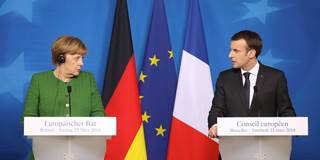For three decades, the consensus within the European Commission and the European Central Bank on the need for market reforms and sound public finances has been strong enough to overcome opposition in small countries and outlast procrastination in large ones. Today, however, the eurozone playing field has become a battleground.
PARIS – It was not supposed to happen like this. The formation of a new German government took so long that it was only after the Italian general election on March 4 resulted in a political earthquake that France and Germany started to work on reforming the eurozone. German Chancellor Angela Merkel and French President Emmanuel Macron have now resolved to sort out their differences and deliver a joint reform roadmap by July. But they cannot ignore changes brought by the landslide victory of Italy’s anti-system parties. Until then, populism had seemed contained. It has now become mainstream.
For those who will have to draw the Franco-German blueprint, the message from Italy is that the policy framework that has dominated Europe since the mid-1980s no longer commands broad support. For three decades, the consensus on the need for market reforms and sound public finances has been strong enough to overcome opposition in small countries (Greece) and outlast procrastination in large ones (France). In the coming years, however, the eurozone playing field may well become a battleground.
The first casualty is bound to be the European Stability and Growth Pact, with its plethora of fiscal rules, monitoring procedures, and eventual sanctions for excessive deficits. The 224-page Vade Mecum on implementing fiscal discipline in the EU is hopelessly complex, to such a degree that no finance minister, let alone parliamentarian, fully understands what his or her country must abide by.

PARIS – It was not supposed to happen like this. The formation of a new German government took so long that it was only after the Italian general election on March 4 resulted in a political earthquake that France and Germany started to work on reforming the eurozone. German Chancellor Angela Merkel and French President Emmanuel Macron have now resolved to sort out their differences and deliver a joint reform roadmap by July. But they cannot ignore changes brought by the landslide victory of Italy’s anti-system parties. Until then, populism had seemed contained. It has now become mainstream.
For those who will have to draw the Franco-German blueprint, the message from Italy is that the policy framework that has dominated Europe since the mid-1980s no longer commands broad support. For three decades, the consensus on the need for market reforms and sound public finances has been strong enough to overcome opposition in small countries (Greece) and outlast procrastination in large ones (France). In the coming years, however, the eurozone playing field may well become a battleground.
The first casualty is bound to be the European Stability and Growth Pact, with its plethora of fiscal rules, monitoring procedures, and eventual sanctions for excessive deficits. The 224-page Vade Mecum on implementing fiscal discipline in the EU is hopelessly complex, to such a degree that no finance minister, let alone parliamentarian, fully understands what his or her country must abide by.